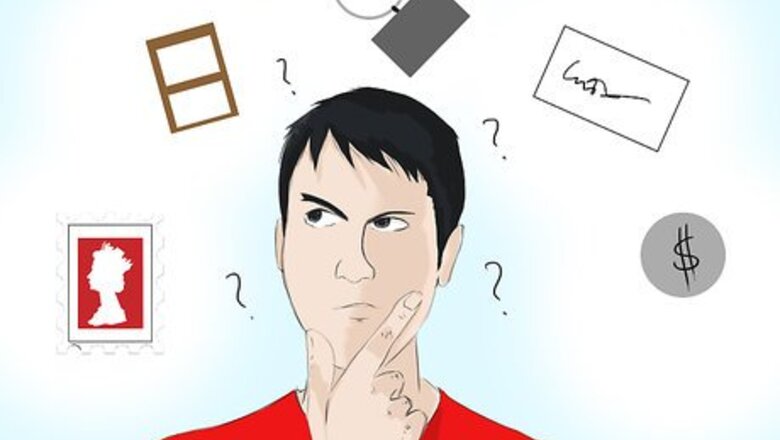
views
Planning Your Collection
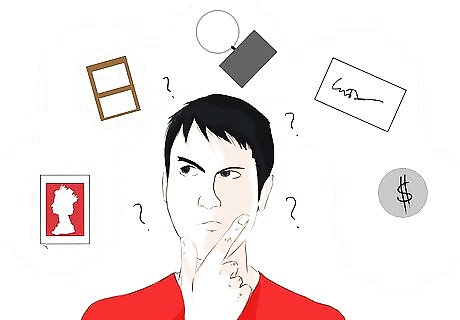
Decide what you want to collect. The most important step in starting a collection is selecting what you want to collect. To do this, consider your interests. Do you like history? Maybe you would like collecting old stamps or coins. Do you enjoy reading? Perhaps you would prefer to collect books. Are you a big traveler? Maybe maps are more your speed. Whatever you pick, make sure it’s something you’re passionate about. Other ideas of things you can collect include autographs, watches, wines, art, hats, figurines, cups, shot glasses, key-chains and postcards. If you like spending time outside, try making your collection nature-based. Consider collecting seashells, rocks or pebbles, fresh flowers, acorns or leaves. If you have inherited a small collection from a friend or family member, consider expanding on that.
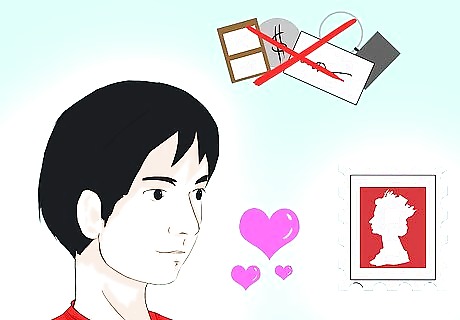
Focus your collection. Once you’ve made your initial choice, it’s time to narrow it down. Saying you’re going to collect books is too vague for a collection; instead, consider collecting used books or children’s books or first edition copies of books. If you’re collecting sports cards, only collect cards for a certain sport or team. The more focused your collection, the more challenging and fun it will be to hunt down your pieces. If you’re collecting rocks, try collecting the rocks by different rock classifications. If that’s too specific, you can collect based on factors like location, color, texture or shape.

Research your collection. Before you buy the first piece for your collection, you need to know what you’re looking for. Spend some time online learning about the history of your collection. Talk to people in online forums about what pieces they have or are looking to buy. The more you know about your collection, the easier it will be to track down specific items. Find out what the most sought after pieces in your collection are and always keep an eye out for them. Decide if you’re collecting for investment or enjoyment. If you’re looking to make money off your collection, you’ll need to do far more research than if you’re just collecting items that make you happy.
Adding to Your Collection
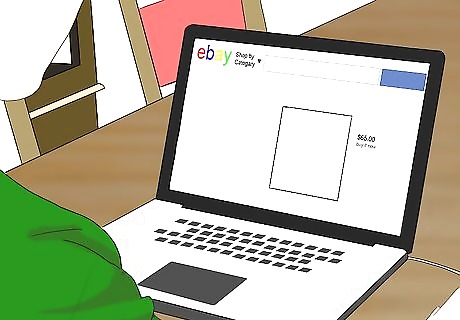
Shop for pieces online. The internet has made shopping so easy you can add to your collection from the comfort of your own home. Start by looking in online forums; collectors are often willing to trade for new items or to sell items they currently own. Ebay is a great place to look for pieces. You can pay outright for items, or bid slowly to try to get the best deal possible. The con to using Ebay is that you don’t get to see the item in person before purchasing. Craigslist is a great option to buy pieces as well. You can search by your location, or if you’re willing to travel a little further, you can expand your search to a nearby state. The added benefit of shopping on Craigslist is you get to see the item in person before committing to buying that item.
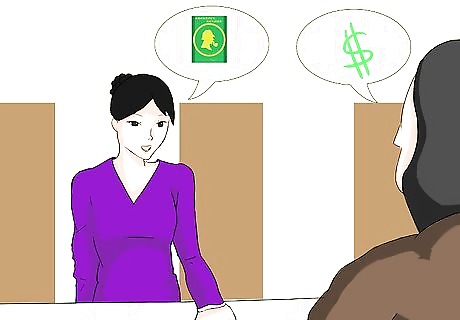
Shop for items in person. While most mainstream stores won’t carry the niche pieces you’re looking for, there are still plenty of places to look. Try visiting Flea Markets in your area, as well as antique stores and thrift stores. On weekends, visit garage and estate sales. Finally, check online to see if there will be any collector shows happening in your area. Collector shows are great ways to meet people within your collection community, and possibly get a new piece out of the deal. When shopping at antique or thrift stores, make sure you dig through every item. The gold is often buried amongst the garbage. Arrive early at garage and estate sales; the best pieces tend to go early. Come back on Sunday, sometimes the owners of the sale will drop their prices to rid themselves of their inventory.
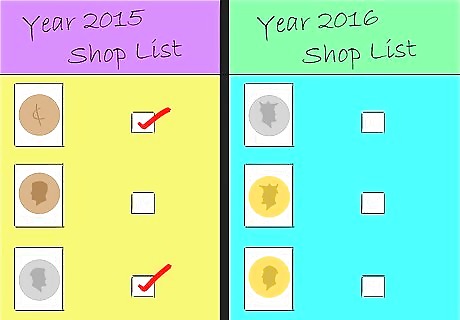
Start cheap and work your way up. Collecting can be an expensive hobby and many people dive right in. Instead, start off slow and aim to only pick up a few pieces each year. This will prevent you from wasting money, burning out and ending up with a lot of items you don’t need or value. Consider only adding to your collection while on vacation. This way, you tie pieces of your collection to fun memories from your travels. Collect from experiences. Pick a collection that doesn’t cost any money. Consider collecting matchbooks from restaurants or coasters from bars. Collect seashells from your beach vacations or rocks from cool hikes. Your collection doesn’t have to be expensive to have personal value.

Know your items. When adding to your collection, learn a fact about the item you're adding. This will give you something to talk about when showing off your collection to others and will also make the collection experience more personal for you. When shopping for pieces, stock up on extras whenever you can. You can use these duplicates as leverage when trading with other collectors. Part of having a collection is refining it. Edit out old pieces you no longer care about to make room for new ones. Sell the old ones on Craigslist or Ebay, or take them to a pawnshop to have them appraised. Use the money you earn to add a new piece to your collection.
Organizing and Displaying Your Collection

Display your collection in curio cabinets. Curio cabinets are cabinets with glass doors, so you can easily show off your collection inside your home. But don’t just pile your entire collection inside; instead, try to tell a story using your collection. Showcase your favorite or most valuable pieces, or pieces that all fit within the same category. If you collect books, try sorting your books based on color or size, rather than subject matter, for a more interesting aesthetic. If you don’t have room for a curio cabinet, spread your collection throughout a couple of rooms in your home.
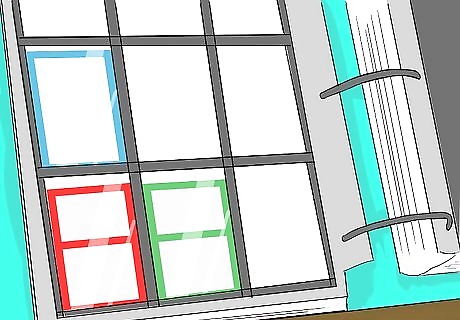
Organize your collection into binders. If your collection consists of small items, like baseball cards or stamps, try organizing them into binders. You can purchase specially designed plastic sheets that will make it easy to organize and store your pieces. The plastic sheeting will also make it easy for you to transport your collection and show it off to your friends. Try using tabs within the binders to organize your collection by category. If you are organizing baseball cards, those categories can be dictated by different positions, teams or years. You can also sort the collection according to what condition each card is in. Be careful to store your binders someplace safe and dry to keep your collection from warping or getting ruined.
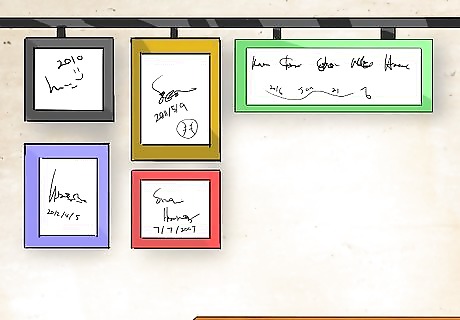
Hang your collection on your walls. If your collection can be hung, try mounting it on the wall. Group your art collection together to create an impactful gallery wall. Hang shadowboxes on the wall to show off your vase collection. Hang floating shelves to display some of your favorite hats from your hat collection. If items from your collection are easily broken, take care not to hang them anywhere dangerous. Update the items you are showcasing. As you buy new pieces, remove the old ones from your walls and replace them with the updated versions. This will keep your collection feeling fresh and exciting and will also serve as an icebreaker when people come to visit. EXPERT TIP Ashley Moon, MA Ashley Moon, MA Professional Organizer Ashley Moon is the Founder and CEO of Creatively Neat, a virtual organizing and life coaching business based in Los Angeles, California. In addition to helping people organize their best life, she has a fabulous team of organizers ready to de-clutter your home or business. Ashley hosts workshops and speaking engagements at various venues and festivals. She has trained with Coach Approach and Heart Core for organizing and business coaching respectively. She has an MA in Human Development and Social Change from Pacific Oaks College. Ashley Moon, MA Ashley Moon, MA Professional Organizer Display collections on trays. You can show collections creatively using display trays and organizer boxes. There are trays designed specially to house collectibles like watches online at stores like The Container Store. This way, they'll be dust-free but still visible, so you can access your favorites daily.










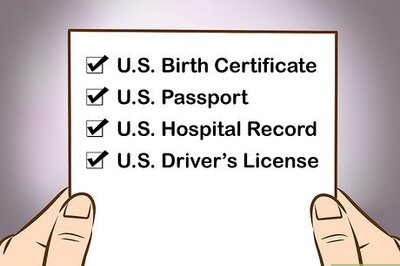









Comments
0 comment